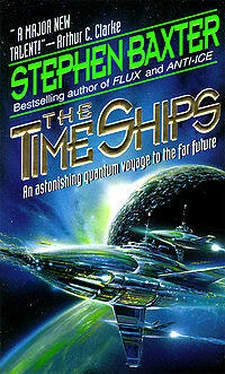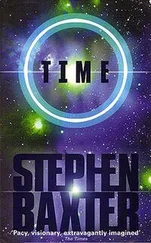The sun lay quite low in the sky, to the west, and its light glimmered from the scattered architecture and the bodies of water which punctuated the verdant landscape. The haze of heat lay everywhere on the land. Time, and the patient evolutions of geology, had metamorphosed this landscape from my day; but I could recognize several features, reshaped though they were, and there was still a dreamy beauty about the poet’s “matchless vale of Thames.” The silver ribbon of the river was some distance removed from me; as I have noted elsewhere, the Thames had cut through a bow in its course and now progressed direct from Hampton to Kew. And it had deepened its valley; thus Richmond was now set high on the side of a broad valley, perhaps a mile from the water. I thought I recognized what had been Glover’s Island as a sort of wooded knoll in the center of the old bed. Petersham Meadows retained much of its modern profile; but it was raised far above the level of the river now, and I imagined the area to be much less marshy than in my day.
The great buildings of this Age were dotted about, with their intricate parapets and tall columns, elegant and abandoned: they were spikes of architectural bone protruding from the hill-side’s green-clad flank. Perhaps a mile from me I saw that large building, a mass of granite and aluminum, to which I had climbed on my first evening. Here and there huge figures, as beautiful and enigmatic as my Sphinx, lifted their heads from the general greenery, and everywhere I saw the cupolas and chimneys that were the signatures of the Morlocks. The huge flowers of this latter day were everywhere, with their gleaming white petals and shining leaves. Not for the first time, this landscape, with its extraordinary and beautiful blooms, its pagodas and cupolas nestling among the green, reminded me of the Royal Botanical Gardens at Kew in my day; but it was a Kew that had covered all of England, and had grown wild and neglected.
On the horizon there was a large building I had not noticed before. It was almost lost in the mists of the north-west, in the direction of modern Windsor; but it was too remote and faint for me to make out details. I promised myself that some day I should make the trek out to Windsor, for surely, if anything of my day had survived the evolution and neglect of the intervening millennia, it would be a relic of the massive Norman keep there.
I turned now and saw how the countryside fell away in the direction of modern Banstead, and I made out that pattern of copses and hills, with here and there the glint of water, which had become familiar to me during my earlier explorations. And it was in that direction — perhaps eighteen or twenty miles distant — that the Palace of Green Porcelain lay. Peering that way now I thought I could make out a hint of that structure’s pinnacles; but my eyes were not what they were, and I was not sure.
I had hiked to that Palace, with Weena, in search of weapons and other provisions with which to take the fight to the Morlocks. Indeed, if I remembered correctly, I — my earlier self — must be rooting about within those polished green walls even now!
Perhaps ten miles away, a barrier interposed between myself and the Palace: a knot of dark forest. Even in the daylight it made a dark, sinister splash, at least a mile thick. Carrying Weena, I had made through that wood safely enough the first time, for we had waited for daylight to make the crossing; but the second time, on our return from the Palace (tonight!) I would let my impatience and fatigue get the better of me. Determined to return to the Sphinx as soon as possible, and to set to work retrieving my machine, I would push into that wood in the darkness — and fall asleep — and the Morlocks would descend on us, and take Weena.
I had been lucky to escape that folly with my life, I knew; and as for poor Weena…
But I put aside these feelings of shame, now, for I was here, I reminded myself, to make amends for all that.
It was early enough for me to reach that wood before the daylight faded. I was without weapons, of course, but my purpose here was not to fight the Morlocks — I had done with that — but simply to rescue Weena. And for that, I calculated, I should need no more powerful weapons than my intellect and my fists.
The Time Machine itself looked very exposed, there on the hill-side with its brass and nickel glittering, and — although I had no intention to use it again — I decided to conceal it. There was a copse nearby, and I dragged the squat machine there and covered it with branches and leaves. This took me some effort — the machine was a bulky affair — and I was left perspiring, and the rails cut deep grooves in the turf where I had hauled it.
I rested for a few minutes, and then, with a will, I set off down the hill-side in the direction of Banstead.
I had traveled barely a hundred yards when I heard voices. For a moment I was startled, thinking — despite the daylight — that it might be Morlocks. But the voices were quite human, and speaking that peculiar, simple sing-song which is characteristic of the Eloi; and now a party, five or six, of those little people emerged from a copse onto a pathway leading up to my Sphinx. I was struck afresh at how slight and small they were — no larger than the children of my time, male and female alike — and clad in those simple purple tunics and sandals.
The similarities with my first arrival in this Age struck me immediately; for I had been chanced upon by a party of Eloi in just such a fashion. I remembered how they had approached me without fear — more with curiosity — and had laughed and spoken to me.
Now, though, they came up with circumspection: in fact, I thought they shied away. I opened my hands and smiled, in tending to show that I meant no harm; but I knew well enough the cause of this changed perception: it was what they had seen already of the dangerous and erratic behavior of my earlier self, especially during my unhinging after the theft of the Time Machine. These Eloi were entitled to their caution!
I did not press the case, and the Eloi went on around me, up the hill-side towards the rhododendron lawn; as soon as I was out of their sight their speech resumed in its bubbling rhythms.
I struck across the countryside towards the wood. Everywhere I saw those wells which led, I knew, to the subterranean world of the Morlocks — and from which emitted, if I drew close enough to hear, the implacable thud-thud-thud of their great machines. Sweat broke across my brow and chest — for the day remained hot, despite the dipping of the afternoon sun — and I felt my breath scratch in and out of my lungs.
With my immersion in this world, my emotions seemed to waken also. Weena, limited creature though she was, had shown me affection, the only creature in all this world of 802,701 to do so; and her loss had caused me the most intense wretchedness. But, when I had come to recount the tale to my companions by the familiar glow of my own fireside in 1891, that grief had been etiolated into a pale sketch of itself; Weena had become like the memory of a dream, quite unreal.
Well, now I was here once more, tramping across this familiar country, and all that primal grief came back to me — it was as if I had never left here — and it fueled my every footstep.
As I walked on a great hunger fell on me. I realized that I could not remember the last time I had eaten — it must have been before Nebogipfel and I departed firm the Age of White Earth — although, I speculated, it might be true to say that this body had never partaken of food, if it had been reconstructed by the Watchers as Nebogipfel had hinted! Well, whatever the philosophical niceties, my hunger was soon gnawing at my belly, and I began to feel a weariness from the heat. I came past an eating hall — a great, gray edifice of fretted stone — and I made a detour from my route.
Читать дальше
Конец ознакомительного отрывка
Купить книгу









